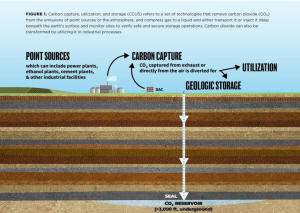Groups push for more oversight of carbon sequestration projects
 Send a link to a friend
Send a link to a friend
 [October 26, 2024]
By Greg Bishop | The Center Square [October 26, 2024]
By Greg Bishop | The Center Square
(The Center Square) – The carbon capture industry lacks significant
transparency with billions of tax dollars at stake, according to groups
urging U.S. Congress for more oversight.
After a series of leaks of carbon capture wells at an ADM plant in
Decatur, Illinois, the company voluntarily halted operations. The issue
has heightened concerns about negative impacts such leaks have on
aquifers and the environment.
During a recent briefing to congressional staffers, Pam Richart from
Eco-Justice Collaborative in Champaign questioned why a halt to
operations at ADM wasn’t ordered by the U.S. Environmental Protection
Agency. She also said ADM knew of leaks while the company was
negotiating carbon sequestration issues with the city of Decatur and
state legislators earlier this year.
“ADM knew their well was leaking. They said nothing,” Richart said.
“Nothing to Decatur. Nothing to the negotiating team. Nothing to the
legislators.”
A spokesperson for ADM said in a statement to The Center Square Friday
that the company plays a "critical role in the advancement and evolution
of this technology."

"We routinely reported to U.S. EPA the intermittent monitoring issues
for VW#2, including the discovery of corrosion on the tubing and action
to plug the well in late 2023 according to our permit," the statement
said. "The independent test results received in late July 2024
confirming the CO2 migration into the Ironton Galesville were also
promptly reported to U.S. EPA. "
ADM contends the leaks posed no threat to the surface or groundwater,
nor to public health.
"It is for those reasons that additional notifications were not made,"
the statement said. "Recognizing the interest in this matter, we have
added updates to our webpage (www.adm.com/ccs) so that anyone can be
kept up to date.":

[to top of second column]
|

A graphic from a Prairie Research Institute report on carbon capture
and storage - Prairie Research Institute, University of Illinois

Paul Blackburn with Bold Alliance spelled out the billions of tax
credits companies can get from the federal government for carbon
storage, but storage must be secure.
“If the storage is not secure then the 45Q tax credit is based on
inadequate security standards for the CO2 that’s being put into the
ground,” Blackburn said.
The Office of Congressional Research reported in an August 2023 document
the actual taxpayer cost of the tax credit for carbon storage operations
over time isn’t clear because of uncertainty about future carbon capture
sequestration development. But the estimated amount is increasing
exponentially.
“In December 2022, the Joint Committee on Taxation estimated that
Section 45Q-associated tax expenditures would be less than $50 million
per year … through 2026, or about $0.2 billion over the 2022-2026
five-year period,” the document said. “The Department of the Treasury’s
March 2022 tax expenditure estimates for Section 45Q were $2.4 billion
for the 2022-2026 five-year period and $30.3 billion from 2022 to 2032,
suggesting an expected increase in tax credit claims in later years.”
With recent leaks at ADM and concerns elsewhere throughout the country,
Food and Water Watch Policy Director Jim Walsh said it’s clear the
technology is not ready and more needs to be done by the U.S. Congress
and the EPA.
“And ensure that the IRS is properly monitoring billions in dollars in
tax credits that the industry is working to exploit,” Walsh said. “And
this really raises serious questions about whether the inspector general
should look into numerous questions raised by these leaks, such as why
the public was not notified of leaks in Illinois, what the EPA knew when
and why it took so long for the EPA to issue a notice of violation.” |